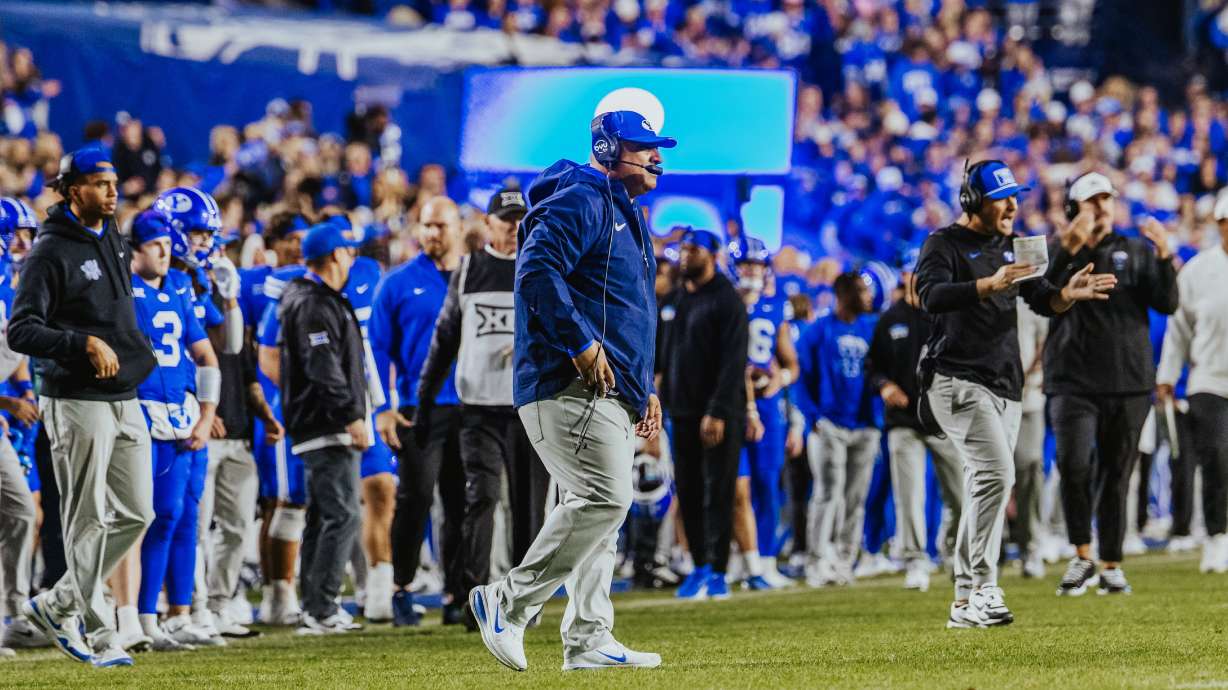PROVO — For what probably felt like the umpteenth time this season (really, it’s only been 2-3), BYU coach Kalani Sitake could hardly enjoy the 11th-ranked Cougars’ 10th win of the season over Cincinnati before some form of the same question was posed.
What do you think this says about your team in relation to the College Football Playoff?
“I’m not here to campaign; I’m just here to play football with our team,” Sitake said in a make-shift postgame press conference with dozens of fans standing around him in one of the end zones at Nippert Stadium. “We’re just trying to find ways to win the game and let the other experts figure that stuff out.
“We’re just going to try to get our next win next week and be thankful for what we do. Football’s hard, man; I want these guys to embrace every moment of it, and we made some really cool memories tonight.”
All of that is fine for the 10th-year head coach of his alma mater, where Sitake is trying to remind his players to keep focused on what matters most. For them, it means the next game, which happens to be Saturday’s regular-season finale against UCF (11 a.m. MST, ESPN2).
Win that game, he’s argued, and the Cougars continue to control their own destiny, book a spot in the Big 12 championship game, and have an opportunity to presumably clinch one of five automatic berths to the College Football Playoff as one of the five highest-ranked conference champions.
Like a hitter standing in the batter’s box against an all-star pitcher, Sitake doesn’t want his team to take its eye off the ball.
That’s what happened a year ago when BYU lost two games down the stretch — at Arizona State, and more critically at home against Kansas before ending the season with an Alamo Bowl win over fellow Big 12 foe Colorado.
In truth, Sitake shouldn’t have to campaign on behalf of his team. The problem? Nobody else is.
BYU athletic director Brian Santiago has remained silent on the Cougars’ playoff candidacy. So, too, has Big 12 Commissioner Brett Yormark. A few national sportswriters have taken up the cause.
But the third-year member of the Big 12 even lacks the political machinery espoused by the SEC and Big Ten to make arguments on the Cougars’ behalf. There is no conference network or army of Paul Finebaums and Josh Pates lining up to make BYU’s case for CFP inclusion.
Since the first College Football Playoff selection show was released, Yormark released a single statement on Nov. 18 after the release of the rankings that have been (and will continue to be) fluid until the day after the Big 12 title game in Arlington, Texas.
“I am thrilled to see the Big 12 Conference getting the respect it deserves,” said Yormark, whose league has five ranked teams, including No. 5 Texas Tech, No. 13 Utah, No. 20 Arizona State and No. 25 Arizona.
“I said at Big 12 football media days in July that we would earn it on the field,” he added, “and we continue to do that.”
But BYU’s potential to “earn it on the field” has been stunted through 11 games of the 2025 season.
The Cougars (10-1, 7-1 Big 12) are the lowest-ranked one-loss team in the committee’s most recent top 25, and trail three two-loss teams: No. 8 Oklahoma, No. 9 Notre Dame and No. 10 Alabama.
And yet, BYU’s resume looks more like No. 6 Oregon than the two SEC teams and one FBS independent immediately in front of the current Big 12 co-leaders.
The Ducks (10-1, 7-1 Big Ten) are the No. 4-rated team in ESPN’s SP+ rankings that ranks teams in a tempo- and opponent-adjusted efficiency measurement, which is intended to be predictive and forward-facing.
The ranking popularized by Bill Connelly currently lists the top-four teams as Ohio State, Indiana, Texas Tech and Oregon, with the Ducks resume including a win of a team ranked No. 19 and 21 in the metric, a loss to the No. 2 team, and the No. 5 strength of record.
BYU is ranked 16th in SP+, with wins over teams ranked No. 9 and No. 25 and a loss to No. 3. The Cougars also have six wins over teams ranked 7-4 or better — four more than Oregon — and the No. 6 strength of record.
All of this is simply data that could be used to make a decision, which committee members have admitted is as much art as science. CFP bids aren’t selected strictly on metrics or computer rankings, after all.
But with no one to guide the conversation, the imperfect humans selected to the committee — which includes Utah athletic director Mark Harlan, who replaced Baylor’s Mack Rhoades — can be swayed by popular opinion, or the oft-cited “eye test.”
The Cougars simply did not “look like” a playoff team when it went to Lubbock and lost 29-7 to the Red Raiders, a team that couldn’t possibly “look like” the best team in college football not named Ohio State or Indiana (which SP+ suggests).
That puts a two-loss team like Notre Dame ahead of teams that include 9-2 Miami — which beat the Irish 27-24 back on Aug. 31 — and one-loss BYU. The same Miami that jumped now-No. 13 Utah after three straight wins over unranked opponents.
“The committee has felt like, as you watched Notre Dame on film, watched their games throughout the year, that they have been consistent,” committee chair Hunter Yurachek, the Arkansas athletic director, said, “even in the early-season games that they lost by three in Miami and by one point to Texas A&M.”
And few with a strong voice are arguing otherwise.
The Key Takeaways for this article were generated with the assistance of large language models and reviewed by our editorial team. The article, itself, is solely human-written.
